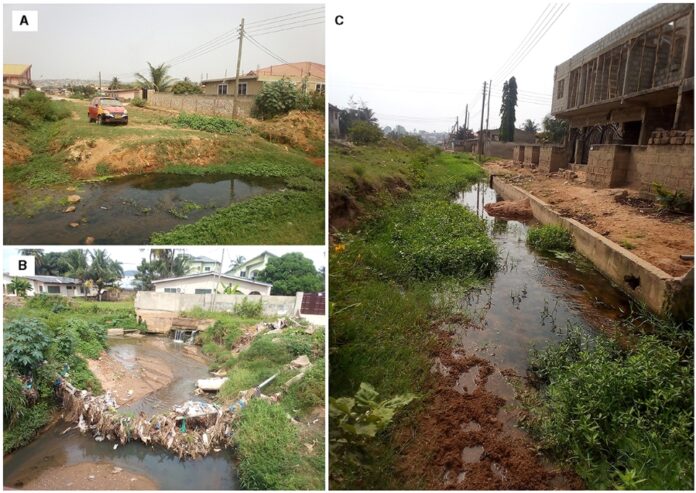A recent study by Oteng-Ababio et al. (2024) titled “Flood Risk Reduction and Resilient City Growth in Sub-Saharan Africa: Searching for Coherence in Accra’s Urban Planning” published in Frontiers in Sustainable Cities shows that the coexistence of traditional and statutory land tenure systems creates conflicts and governance challenges, leading to unplanned development and increased flood risks.
“
Conflicts between traditional and statutory land tenure systems exacerbate flood risks in Accra’s urban planning.– Oteng-Ababio, et al., 2024
This study delves into flood risk reduction and fostering resilient urban growth in Accra, Ghana. It investigates how rapid, unplanned urban development and climate change have intensified flood risks in the city. A significant focus is placed on the conflicts between traditional and formal land tenure systems, which complicate effective land use and management. The research highlights how different land ownership and management regimes contribute to increased flood risks. Traditional land tenure systems, often based on communal or customary laws, clash with formal systems that follow governmental regulations. This dichotomy creates inconsistencies in land use, making it difficult to implement cohesive flood risk management strategies. The study underscores the challenges of integrating disaster risk reduction measures into local planning frameworks, which often fail to align with community practices and needs. To illustrate these issues, the study examines Santa Maria, an ecologically sensitive community in Accra. Here, unregulated land development has exacerbated flood risks, providing a tangible example of how a lack of oversight and planning can lead to environmental degradation and increased vulnerability to natural disasters. The case of Santa Maria demonstrates the critical need for improved spatial planning and regulatory enforcement to mitigate flood risks. By addressing the root causes of flood risks and proposing comprehensive solutions, the study aims to provide a holistic approach to managing flood risks in Accra. The ultimate goal is to create a resilient urban environment that can withstand the challenges posed by rapid development and climate change, ensuring sustainable growth and improved quality of life for the city’s residents.
How the Study was Conducted
The author investigated the relationship between customary land ownership, administration, and land use planning practices and their role in generating flood risks. The research methodology included direct observation and in-depth interviews with key informants such as municipal planning officers, officials from the National Disaster Management Organization (NADMO), assembly members, traditional authorities, residents’ associations, and transport unions. To document the physical characteristics of the environment, the author conducted transect drives and walks, collected GPS track logs, took photographs, and recorded detailed field notes. The interview data was analyzed using QSR Nvivo software, employing an open-coding process to identify recurring themes and concepts.
What the Authors Found
The authors found that the coexistence of traditional and statutory land tenure systems creates conflicts and governance challenges, leading to unplanned development and increased flood risks. The authors posit that the lack of enforcement of spatial planning regulations results in most peri-urban land-use development being led by local developers, often without adequate infrastructure. In addition, unregulated housing developments in flood-prone zones, inadequate drainage systems, and waste management issues exacerbate flood risks.
Why is this Important
Urban Resilience: Understanding the challenges posed by traditional and statutory land tenure systems helps policymakers and urban planners develop strategies to enhance the city’s resilience against natural disasters like floods.
Sustainable Development: By addressing land governance issues and integrating disaster risk reduction into spatial planning, Accra can achieve more sustainable development. This involves balancing economic growth with environmental protection and community well-being.
Community Engagement: The study emphasizes the importance of involving local communities in planning and decision-making. Their insights and participation are crucial for effective flood risk management and urban growth.
Policy Implications: The recommendations provided by the research can inform policy changes, leading to better land management practices, improved infrastructure, and reduced flood vulnerability.
What the Authors Recommended
- To mitigate conflicts and governance challenges, the authors suggest that Accra should integrate traditional land tenure practices with formal planning. This approach can lead to better land governance and planned development.
- The author advocates strengthening the enforcement of spatial planning regulations to prevent unplanned development. This includes monitoring land-use changes and ensuring compliance with zoning laws.
- Incorporate DRR principles into urban planning. This involves designing infrastructure that can withstand floods, improving drainage systems, and managing waste effectively.
- In addition, the authors recommend involving local communities in decision-making processes. Their insights can inform effective flood risk management strategies and enhance urban resilience.
In conclusion, addressing the complex interplay between traditional and statutory land tenure systems is crucial for mitigating flood risks and fostering sustainable urban development in Accra. By integrating community insights, enhancing regulatory enforcement, and prioritizing disaster risk reduction in planning, Accra can build a resilient city that balances growth with environmental stewardship and improves the quality of life for its residents.
















 The African Research (AR) Index is a comprehensive scholarly directory and database focused explicitly on journal publishers that publish and disseminate African research.
The African Research (AR) Index is a comprehensive scholarly directory and database focused explicitly on journal publishers that publish and disseminate African research.

